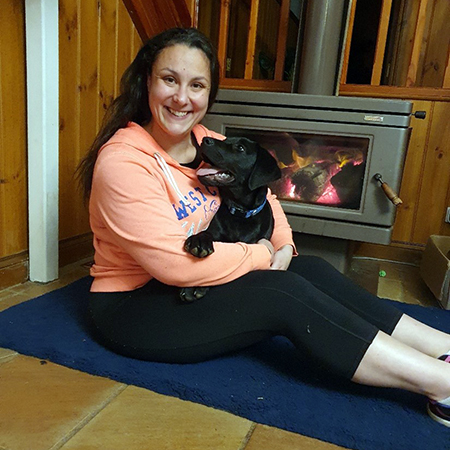Learning to love the new me
By Sarah Miles
Monday July 6, 2020 is a day that will forever be ingrained in my memory.
I woke with an intense headache and loss of my peripheral vision. I passed off my vision issue as tired eyes and took a tablet to ease my headache.
But when these problems lingered, I made an appointment to see my local GP. Then I visited an ophthalmologist, who performed a series of tests. It was there where the words ‘potential stroke’ were uttered for the first time. Stroke? That could not be right I thought. I am only 33.
Hours later, I found myself in a hospital emergency department. I felt completely fine physically, but I was confused and baffled. I remember how incredibly overwhelmed I felt that I may have had a stroke. There were so many thoughts and feelings buzzing through my head.
It took multiple tests over several days to reach an official diagnosis:
Sarah, a 33-year-old female suffered an early onset Ischaemic Stroke (clot) to the Occipital Lobe, caused by a right vertebrae arterial dissection, resulting in a right Homonymous Hemianopia.
Yep, it was terminology I quickly had to educate myself on (and everybody else). My life had been turned inside out and flipped upside down.
Twelve months on and life has certainly been a journey!
I live in Melbourne and I only had two weeks to wrap my head around my diagnosis before the city was thrown into its second coronavirus pandemic lockdown.
This meant I had to home school our three children, look after our 6-month-old baby and tend to all the other day-to-day tasks around the home. I had no choice but to hit the pause button on my recovery.
There came a point when I realised I had to stop putting myself last and focus on my recovery. This was not easy. At times, it felt incredibly selfish. But I had to make my recovery my priority and goal for me and, in turn, my family. I’ve had to learn to get to know my altered-self (as I like to call it). This includes my new limitations, physically, mentally, socially, and emotionally. I have had to learn my weaknesses and triggers and work through dealing with them in a positive and productive way.
I, like so many other stroke survivors in my position, have been left with an invisible disability. The struggles and frustrations are real, and I live my life one day at a time. I do my absolute best when I can. Some days I’m on top of the world and other days I am a mess, barely keeping it together.
I’ve had to learn that not everybody is accepting or can accept my altered self. As heartbreaking as it has been, I am learning to let go and accept” their absence in my life. It’s been a big part of my ongoing recovery, mentally. It has been important for me to allow myself the time I need to come to terms with every situation.
I now look for the good in people around me. Seemingly small gestures can make my day. Things like a sales assistant commenting on how well behaved my children have been, to the lovely gentleman down the street greeting me with a smile or the friend or family member who just called to see how I am. These are the people who make my days just that little bit easier. No amount of love and support for a struggling stroke survivor is too much or too little. It is wanted and most importantly, needed.
I have been so extremely fortunate to have a support network like no other. I focus my time and energy on those who have been there for me from the get-go. I try not to sweat the small stuff and remain as happy and as positive as I was before my stroke. Accepting my altered self” is not easy for everyone (myself included), but deep down my heart and soul remains the same. It has and always will remain full of love, un-altered!
These days I do what I can to help further educate family and friends, as well as the wider community, on the effects of stroke for individuals and also for their families and carers. While many people are aware of the most common signs of stroke, F.A.S.T. (Face, Arms, Speech, Time), my stroke demonstrates there are many other red flags like headaches and visual problems.
Stroke does not discriminate, it can strike anybody of any age at any moment in time. I am incredibly lucky to be still living to tell the tale and spread further awareness.

